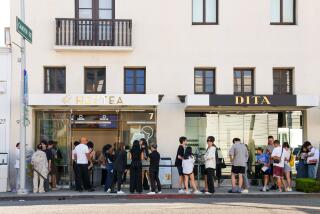Success Is Brewing on Only U.S. Tea Plantation
- Share via
CHARLESTON, S.C. — William Barclay Hall is a third-generation, English-trained tea taster, Mack Fleming a horticulturist. But in the decade they have owned America’s only commercial tea plantation, they have learned to be salesmen, cheerleaders and tour guides as well.
And while their cup hasn’t run over, it’s getting closer to the rim.
Tea from the Charleston Tea Plantation--sold under the American Classic and Governor Gray names--can be found on shelves of most supermarkets in the Carolinas and Georgia and in a number of chains around the country.
Fleming and Hall won’t discuss sales or the size of their crop, but note that their tea is now exported to Japan and Spain and sold to Wal-Mart for its Sam’s Choice brand.
The company also sends out 20,000 mail-order catalogs a year selling everything from “Tea shirts” and picnic baskets to tea bags and bottled tea.
“I’ve seen it on the shelves of the A&P; in the Northeast and that’s quite a coup” for a small company, said Jane McCabe, editor of the Tea and Coffee Trade Journal.
*
The tea trail began in 1987, when Hall and Fleming bought the 130-acre plantation 20 miles west of Charleston from Lipton, which was running it as an experimental station.
Fleming had been managing the station for Lipton, growing 320 types of tea.
“We have whittled it down to seven or eight varieties that we feel do well,” Hall said.
Tea had been grown in the area for two centuries and it didn’t take Hall and Fleming long to develop the American Classic blend. It took longer to find the right blend of marketing.
“We enjoyed growing the tea and making the tea and packaging the tea. But all the tea we have here packaged and ready to go is really of no value unless you turn it into green,” Fleming said. “We struggled.”
Hall agreed, explaining: “We thought we’d be rich in two years.”
Then came the realization: “The average customer doesn’t go into the supermarket today and say, ‘I wonder if there is a new tea on the shelf.’ You have to create some sort of interest,” Hall said.
And American Classic has some selling points: It is the only American tea, it has been served in the White House and it is grown without the use of insecticides.
“There are no natural enemies to the tea plant here,” Hall said.
Overall, tea is a hard sell.
Editor McCabe said many supermarkets lose money on tea.
The price for tea has remained stable for years. For about $2 you can get 100 tea bags. Tea is grown in 35 counties and in some of them, harvesters are paid only a few dollars a week.
To keep costs down, the Charleston plantation, with a staff of about 35 during the May-through-October harvest season, uses a mechanical harvester of Fleming’s design.
So far, marketing efforts have been one-on-one with store owners and managers, and through guided tours of the plantation. Fleming and Hall also make the rounds of civic groups to promote their tea.
More to Read
Inside the business of entertainment
The Wide Shot brings you news, analysis and insights on everything from streaming wars to production — and what it all means for the future.
You may occasionally receive promotional content from the Los Angeles Times.








